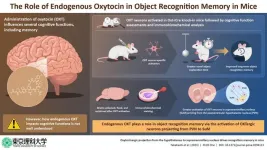Oxytocin (OXT) is a hormone that is known for its effects on psychological well-being and emotional bonding in animals. Interestingly, research has shown that this natural chemical in the brain plays a crucial role in other cognitive processes as well, including learning and memory. Now, scientists may have discovered exactly how OXT influences memory in animals by studying “OXT neurons” that contain OXT receptors and function differently based on the availability of the chemical in the brain.
In a recent study published on 16 November 2023, in PLOS One, a group of researchers, headed by Professor Akiyoshi Saitoh, along with Junpei Takahashi from the Tokyo University of Science, delved into the complex neural pathways and signaling mechanisms activated by OXT. They offered unprecedented insights into its implications for learning and memory. “Previously we had suggested that oxytocin may be a new therapeutic candidate for dementia based on studies using a mouse model of Alzheimer's disease. To investigate this further, in this study, we examined the role of endogenous OXT in mouse cognitive function. This was done by using pharmacogenetic techniques to specifically activate OXT neurons in specific brain regions. The cognitive function of mice was then evaluated using the Novel Object Recognition Task (NORT),” explains Prof. Saitoh.
The research emphasizes the significant role of OXT in regulating social memory, as deficiency in either OXT or its receptors has been linked to aberrant social memory in mice. This groundbreaking study, however, shifts the focus to the role of endogenous OXTergic projections in learning and memory, particularly within the supramammillary nucleus (SuM).
To identify the neurons that are responsible for OXT’s effect on memory, the researchers visualized slices of the mouse brain after specifically activating OXT neurons in the paraventricular hypothalamic nucleus (PVN), observing positive signals in the PVN and its projections to the SuM. Additional validation of OXTergic neuron activation was confirmed through increased c-Fos positive cells (indicating neuron activation) in the PVN after administering clozapine N-oxide (used to activate the neurons).
Further, the study focused on the impact of OXTergic neuron activation on learning and memory using the Y-maze and NORT. Surprisingly, no changes were observed in short-term spatial memory in the Y-maze test. However, the activation of OXTergic neurons significantly boosted long-term object recognition memory in the NORT. Intriguingly, an increased number of c-Fos positive neurons in SuM and the dentate gyrus (a region within the brain’s hippocampus) after NORT indicated the involvement of OXTergic neurons in maintaining long-term memory through these regions. Additionally, the team employed selective activation of OXTergic axons in SuM, resulting in mice spending more time exploring novel objects, suggesting a direct modulation of object recognition memory by OXTergic axons projecting from PVN to SuM.
This study, for the first time, reveals the involvement of OXT in object recognition memory through the SuM. It suggests potential implications for understanding the role of physiological OXT in Alzheimer's disease and highlights the involvement of OXTergic projections in modulating recognition memory. “There is a widely acknowledged belief that dementia tends to advance more rapidly in settings where individuals experience loneliness or limited social engagement. However, the scientific underpinnings of this phenomenon have remained largely elusive. Our research seeks to elucidate the crucial role of a stimulating environment that activates oxytocin in the brain, potentially mitigating the progression of dementia,” explains Prof. Saitoh. The ongoing exploration of this field is anticipated to pave the way for innovative treatments and pharmaceutical interventions aimed at halting the advancement of dementia.
***
Reference
DOI: https://doi.org/10.1371/journal.pone.0294113
About The Tokyo University of Science
Tokyo University of Science (TUS) is a well-known and respected university, and the largest science-specialized private research university in Japan, with four campuses in central Tokyo and its suburbs and in Hokkaido. Established in 1881, the university has continually contributed to Japan's development in science through inculcating the love for science in researchers, technicians, and educators.
With a mission of “Creating science and technology for the harmonious development of nature, human beings, and society," TUS has undertaken a wide range of research from basic to applied science. TUS has embraced a multidisciplinary approach to research and undertaken intensive study in some of today's most vital fields. TUS is a meritocracy where the best in science is recognized and nurtured. It is the only private university in Japan that has produced a Nobel Prize winner and the only private university in Asia to produce Nobel Prize winners within the natural sciences field.
Website: https://www.tus.ac.jp/en/mediarelations/
About Professor Akiyoshi Saitoh from Tokyo University of Science
Professor Akiyoshi Saitoh, a distinguished researcher and Professor at Tokyo University of Science's Faculty of Pharmaceutical Sciences, is renowned for his expertise in medical and behavioral pharmacology, neuroscience, and anti-anxiety drug development. Holding a Ph.D. from Hoshi University, he has authored over 100 impactful publications in areas such as Pharmacology, Psychopharmacology, and Neuropharmacology. With four patents to his name, Prof. Saitoh's innovative contributions have left a lasting mark. His influential work, reflected in numerous citations, establishes him as a key figure in advancing pharmaceutical and neuroscience disciplines.
END






